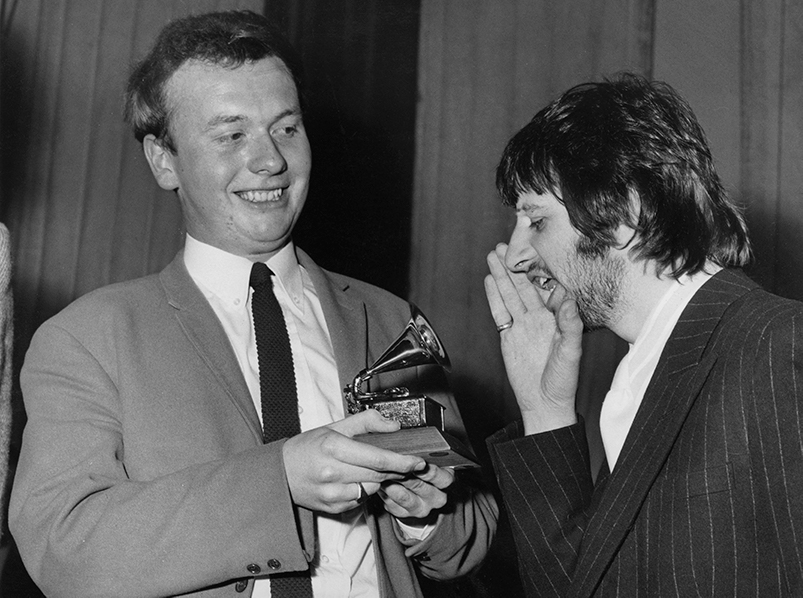Geoff Emerick, the Beatles’ chief recording engineer, has died
His legacy includes ‘Revolver,’ ‘Sgt Pepper’s Lonely Hearts Club,’ ‘Abbey Road,’ and more.

Drummer Ringo Starr of English rock band the Beatles congratulates EMI recording studio audio engineer Geoff Emerick (left) on his Grammy Award at the EMI studios in London, 7th March 1968. (Photo by Monti Spry/Central Press/Hulton Archive/Getty Images)
Geoff Emerick, the luminary who’d served as the Beatles’ chief engineer, has died. He was 72.
According to a statement his manager and close friend William Zabaleta made to Variety, Emerick is believed to have suffered a heart attack. “Today at around 2 o’clock, I was making my way back from Arizona to Los Angeles to pick up Geoff so we could transport some gold records and platinum plaques to our show in Tucson. While on the phone, he had complications and dropped the phone. I called 911, but by the time they got there, it was too late. Geoff suffered from heart problems for a long time and had a pacemaker,” he said.
Emerick’s remarkable career began at age 15, when he was hired as an assistant engineer at Abbey Road Studios. Not long after, he started working with the Fab Four, serving on numerous early hits like “A Hard Day’s Night,” “Love Me Do,” and “I Want to Hold Your Hand.” A few years later, just shy of turning 19, he became the Beatles’ chief engineer.
Emerick excelled in this role thanks to the innovation he brought to the mix. He explored much of it in his 2006 memoir, Here, There and Everywhere: My Life Recording the Music of the Beatles. For example, when John Lennon had requested Emerick make him sound like “the Dalai Lama singing on a mountain” on “Tomorrow Never Knows,” he put the singer’s voice through a spinning Leslie speaker.
“Paperback Writer” was another such song that saw Emerick throw the proverbial recording rulebook out the window. “’Paperback Writer’ was the first time the bass sound had been heard in all its excitement. For a start, Paul played a different bass, a Rickenbacker. Then we boosted it further by using a loudspeaker as a microphone. We positioned it directly in front of the bass speaker and the moving diaphragm of the second speaker made the electrical current,” he explained in Mark Lewisohn’s book, The Complete Beatles Recording Sessions.
Alongside the Beatles’ legendary producer, George Martin, Emerick worked on Revolver, the White Album, Magical Mystery Tour, Sgt Pepper’s Lonely Hearts Club and Abbey Road. His efforts in the latter two albums won him Grammy Awards for “Best Engineered Album.”
Apart from working with the Fab Four—and on Paul McCartney’s solo material—Emerick also lent his engineering brilliance to the likes of The Zombies, Elvis Costello, Michael Jackson, Stevie Wonder, and many others.
Stream Abbey Road here:
